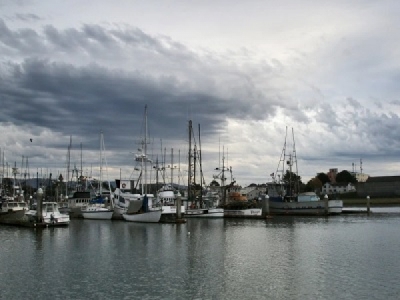
Posted on October 22, 2018
A lawsuit was filed against the Humboldt Bay Harbor Recreation and Conservation District by the Humboldt Fishermen’s Marketing Association and Trinidad Bay Fishermen’s Association.
The two fishing groups are suing over a long list of allegations that include alleged dredging failures and money management issues among other things. The lawsuit was filed in September.
“Our objection is that the harbor district has essentially abandoned their mandated duty to maintain and protect the Woodley Island Marina for the benefit of the fishing fleet,” said Ken Bates, vice president of HFMA, who emailed a news release announcing the lawsuit.
Dredging issues
One of the primary reasons behind the lawsuit is the alleged failure of the harbor district to dredge the marina, which according to Bates has created a multitude of hardships for fishermen. He said that at this point, many boats are unable to get in and out of their slips unless it is high tide.
Larry Oetker, executive director of the harbor district, said he believes the marina hasn’t been dredged since sometime between 2007-08. Oetker said this is primarily because the harbor district has been unable to secure permits to use their suction dredge, which Oetker says is the most environmentally friendly way to dredge.
“You cannot dredge if you do not get permits,” he said.
The main holdup in acquiring the permits, according to Oetker, was concern over the impact the harbor district’s dredging equipment would have on longfin smelt, a species of fish listed as threatened under the California Endangered Species Act in 2009. The worry, according to Oetker, is that the longfin smelt would be sucked up by the suction dredge.
The harbor district recently changed tactics and applied for a permit to dredge with a clamshell dredge which is slow, inefficient, less environmentally sound and less cost-effective than the suction dredge, according to Oetker. He said suction dredging costs about $12 to $14 per cubic yard, whereas clamshell dredging costs about $25 to $45 per cubic yard. Oetker says suction dredging is the solution to the problem, as it costs less and provides potential material —dredge spoils — for restoration projects and sea level rise protection.
Within the past two months, Oetker said the harbor district has received all the permits necessary to dredge the marina with a clamshell dredge. They cannot begin, however, until July 15, 2019.
Andrew Stunich, the attorney representing the two fisherman’s associations, said in an email, that “the district’s attempts, if any, to keep the Marina properly dredged seems, at best, to have been less than determined.”
According to Craig Goucher, president of TBFA, some boats risk losing their live catches if they dock at some of the slips, because the silt is so high it gets sucked into the water that floods the tanks where the catches are held. This means some boats, despite paying for a slip, have to tie up at other places if they have live catches on board, Goucher said.
Money management
Bates said the financial records kept by the harbor district are “strange.”
The news release he provided about the lawsuit claims there was a “disappearance of $656,000 from the Woodley Island Marina dredging fund in 2013,” which then later reappeared.
“We don’t know if they have any money or not,” he said.
When asked whether or not these funds disappeared as Bates described, Oetker did not provide a “yes” or “no” response.
Instead, he said that during the harbor district’s regular meeting July 26, 2018, it was recommended that staff establish the dredging fund balance.
“There are four different methods to look at the funds,” Oetker said.
Of those, he said, he used one which determined the amount to be $1,568,290.
A ‘last resort’
A “routine case management conference” is set, Stunich said, but he did not provide a specific date. He added that the counsel for the harbor district states plans to file an objection asserting there is no factual basis for the case.
Bates said the lawsuit was a “last resort.”
“We’ve tried and tried and tried to talk to these guys, but they just look at you and keep on going,” he said. “Fishermen don’t sue people. They go fishing.”
Source: Times Standard





